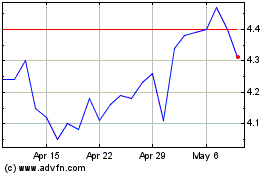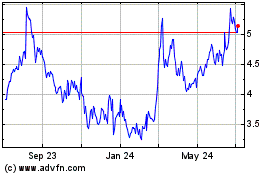By Denise Roland and Noemie Bisserbe
The history of inhalable insulins for diabetes care is full of
disappointments, but Sanofi SA thought a new approach would turn
all of that around. It was wrong.
The French drugmaker last month ended a licensing pact with
MannKind Corp. for the rights to sell the insulin inhaler Afrezza,
saying that despite substantial marketing efforts, the product was
unlikely to reach even the lowest patient levels anticipated. The
product, launched in the U.S. in February last year, notched just
EUR7 million ($7.8 million) in sales in 2015, as safety concerns
and reimbursement issues damped uptake.
Sanofi's bet on inhaled insulin shows the strain pharmaceutical
chiefs are under to acquire innovative products when their own
pipelines aren't delivering. It came at a tough time for the
company's all-important diabetes franchise, which has been forced
to offer deeper discounts on its products amid pricing pressure
from U.S. payers.
On Tuesday, Sanofi said sales of its diabetes drugs in the U.S.
slumped 25% at constant exchange rates to EUR1.1 billion in the
fourth quarter, dragging world-wide revenue from the diabetes
franchise down 13% to EUR1.9 billion. That weighed on total sales,
which came in at EUR9.3 billion, a drop of 1.6% on a constant
currency basis; including currency effects, revenue rose 2.3%.
Profit slid 75% to EUR334 million, while business net income,
which excludes certain one-time items, fell 7% to EUR1.7
billion.
Sanofi Chief Executive Olivier Brandicourt had been down the
inhaled-insulin path before. Nearly 10 years ago, he presided over
the multibillion-dollar flop of insulin inhaler Exubera as head of
metabolic and cardiovascular medicine at Pfizer Inc. Shortly after,
Novo Nordisk A/S and Eli Lilly & Co. shelved advanced plans to
develop their own inhaled products.
The failure of Exubera was, in large part, one of design:
diabetes patients were reluctant to use the unwieldy device in
public as it resembled a bong for smoking marijuana.
But others saw more fundamental reasons to scrap the idea: Novo
Nordisk said at the time that it couldn't overcome the fact that
inhaled insulin wouldn't eliminate the need for injections. That is
because only short-acting insulin, which is taken as a boost at
mealtimes, could be administered via an inhaler. Most diabetes
patients on insulin--those with Type 1 or advanced Type 2--also
take a long-acting version to provide a constant minimum level,
which would need to be injected.
Furthermore, doctors are cautious about prescribing inhaled
insulin because of worries it could lead to lung cancer in the long
term, said Simon O'Neill, director of health intelligence at
Diabetes UK, a nonprofit patient-advocacy group. While there is no
evidence that inhaled insulin causes lung cancer, other so-called
growth hormones have been linked to the disease.
Despite the industrywide retreat from inhaled insulin, former
Sanofi CEO Christopher Viehbacher believed the advantages of
inhaled insulin--speedier delivery to the bloodstream and a reduced
dependence on needles--meant it was still worth a bet. In 2014, he
agreed to pay MannKind up to $925 million, mostly in milestone
payments, for the rights to market the recently approved Afrezza.
By ending the agreement when it did, Sanofi capped its 2015 losses
at roughly EUR200 million, according to the company.
Analysts have predicted that without the support of Sanofi,
MannKind would end up in bankruptcy. Nonetheless, the Valencia,
Calif., company's new CEO, Matthew Pfeffer, has vowed it is "here
to stay." After the break with Sanofi, he told investors he planned
to cut the price of Afrezza and find a new partner for the product,
adding that MannKind had enough cash to get "comfortably into the
second half of the year."
MannKind also announced Jan. 22 that a newly established company
called Receptor Life Sciences had agreed to license MannKind's
inhaler technology in other diseases such as chronic pain and
neurologic diseases, paying $102 million in milestone payments but
no upfront cash.
One reason Sanofi believed it could succeed where Pfizer had
failed was that Afrezza's compact, whistle-shaped design overcame
Exubera's design flaws. A spokeswoman for Sanofi said the track
record of MannKind's founder, the billionaire Alfred Mann, also
bolstered the company's confidence in the product. Among Mr. Mann's
past ventures is the best-selling MiniMed insulin pump, now
marketed by Medtronic Inc.
But Sanofi badly underestimated the toll that safety concerns
would have on Afrezza's sales.
Existing worries among doctors over links with lung cancer were
compounded by the U.S. Food and Drug Administration's warning that
inhaled insulin could cause breathing difficulties in people with
respiratory problems. The agency also required MannKind to run a
follow-on trial to determine whether Afrezza did increase patients'
cancer risk.
The agency also stipulated that doctors test patients' lung
health with a device known as a spirometer before prescribing the
drug. As most diabetes doctors don't have a spirometer, they would
need to send patients to another physician for the test.
Doctors might have been more willing to take on the risk and
effort of prescribing Afrezza if MannKind had demonstrated that it
is more effective than injected insulin, said Jane Chiang, senior
vice president for medical affairs at the American Diabetes
Association. But the company's clinical trials for Afrezza proved
only that it is as effective as, not better than, the injected
alternative, a status that is reflected in Afrezza's FDA label.
Further, most payers in the U.S. have Afrezza in a "tier three"
reimbursement category. That generally comes with higher copays and
requires physicians to explain why they prescribed Afrezza over
standard injected insulin. Sanofi also priced Afrezza at a premium
to its injectable counterparts.
MannKind's Mr. Pfeffer said pricing and reimbursement issues
"dramatically outweigh the other factors" related to Afrezza's slow
uptake.
Without a clinical trial showing that Afrezza worked better than
injected insulin, Sanofi's advertising campaign centered on the
novelty of inhaling versus injecting. But the company overestimated
the extent to which patients would switch to Afrezza due to a
needle aversion, said Eamonn O'Connor, an analyst at the
health-care consulting firm Decision Resources Group.
Despite these setbacks, Afrezza has gained a small but avid
following among patients who say it works significantly better for
them than injected insulin.
Forty-year-old Mike Parise said his blood sugar starts falling
within five to 10 minutes after he takes Afrezza, much quicker than
with injected insulin. "For someone who's had Type 1 for 20 years,
that's a beautiful thing," he said.
Jackie Klass, 52, said using Afrezza had helped her gain control
over her blood-sugar levels for the first time since she was
diagnosed 17 years ago and had "changed my life." She owns shares
in MannKind.
But many others didn't stick with it: A Sanofi spokeswoman said
that of the 6,000 patients prescribed Afrezza since its launch,
only 35% stayed on the treatment.
Write to Denise Roland at Denise.Roland@wsj.com and Noemie
Bisserbe at noemie.bisserbe@wsj.com
(END) Dow Jones Newswires
February 09, 2016 16:21 ET (21:21 GMT)
Copyright (c) 2016 Dow Jones & Company, Inc.
MannKind (NASDAQ:MNKD)
Historical Stock Chart
From Mar 2024 to Apr 2024

MannKind (NASDAQ:MNKD)
Historical Stock Chart
From Apr 2023 to Apr 2024
